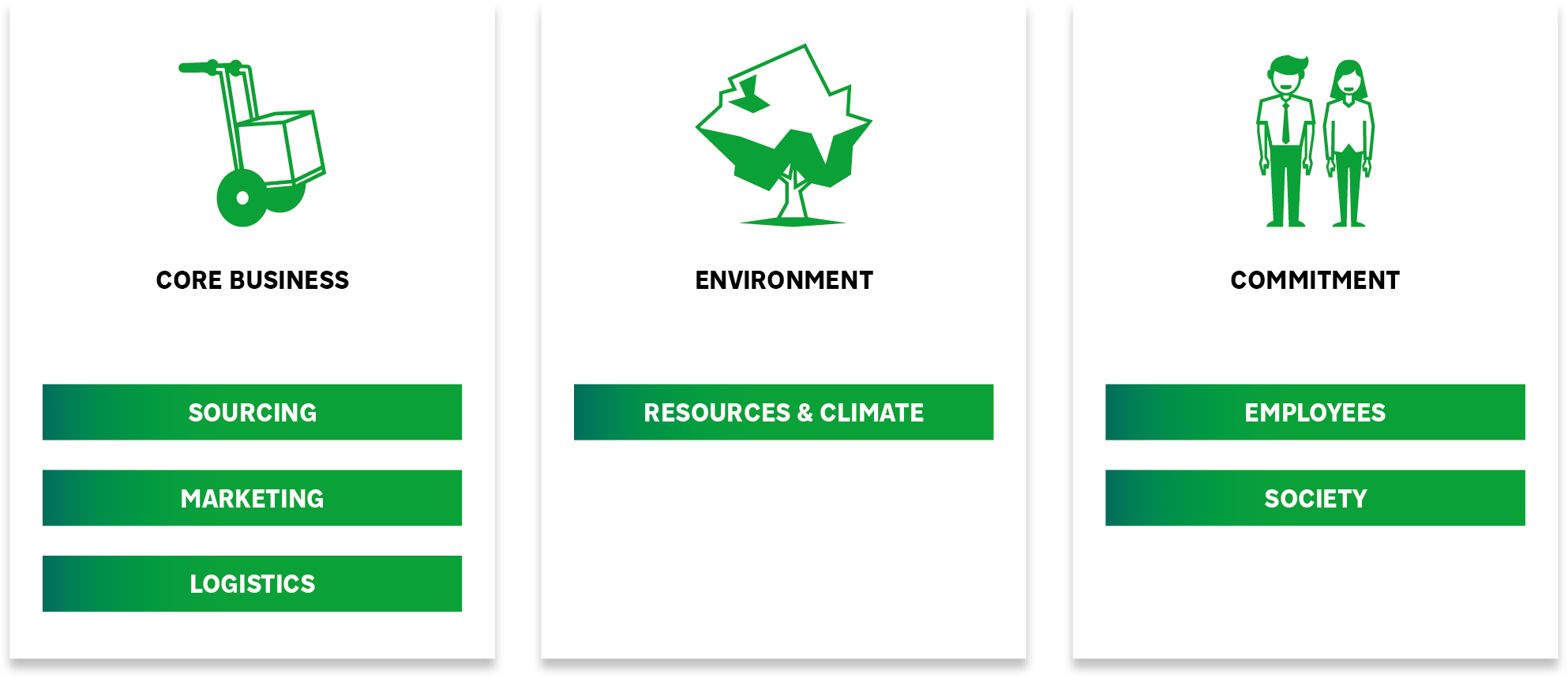The Holding Company places its focus where it has the greatest leverage: in developing and managing the divisions. Haniel lays down guidelines and principles for CR management.
Rules of procedure which set out the framework for collaboration on the basis of statutory provisions stipulate that the Holding Company be involved in the development of the divisions’ CR strategies. This is because we have an interest in all divisions prioritising those CR issues which are relevant to them on the basis of stakeholder expectations, developing on that basis an individual CR programme for each business model with objectives and measures, and implementing them by establishing a CR organisation. At the management and departmental levels, there are Corporate Responsibility officers and a regular CR dialogue between the Holding Company and the divisions. In addition, we organise the Group CR Round Table, where CR experts exchange information and experience. Responsibility for coordinating CR activities at the Holding Company and within the Haniel Group lies with Strategic Investment Controlling.
The following sections show in detail the extent to which the divisions live by our CR standards:
BekaertDeslee is a globally leading specialist for the development and manufacturing of mattress textiles. From its headquarters in Belgium, the company oversees a global network of 27 production locations in 19 countries.
Its product range primarily consists of woven and knitted textiles that are sold to mattress manufacturers in the Americas, Europe and the Asia-Pacific region. BekaertDeslee works together with its customers to develop and produce mattress textiles to the customers' standard of quality in terms of both design and product features.
Assuming sustainability means offering safe, high-quality products and ensuring that business activities are environmentally friendly and socially responsible, it is an essential part of BekaertDeslee’s basic values and deeply rooted in the corporate culture through the following four guiding principles: 1. The conformity principle; 2. The prevention principle; 3. The Zero-defect principle; 4. The principle of measuring. In 2017, the division also defined its CR focus areas after conducting a stakeholder survey. At the conclusion of this process, the activities were aligned accordingly and a roadmap was drawn up: Under the leadership of the top management, an interdisciplinary team prioritises and initiates sustainability projects along the entire value chain.
Find out more at www.bekaertdeslee.com/en/about/cr
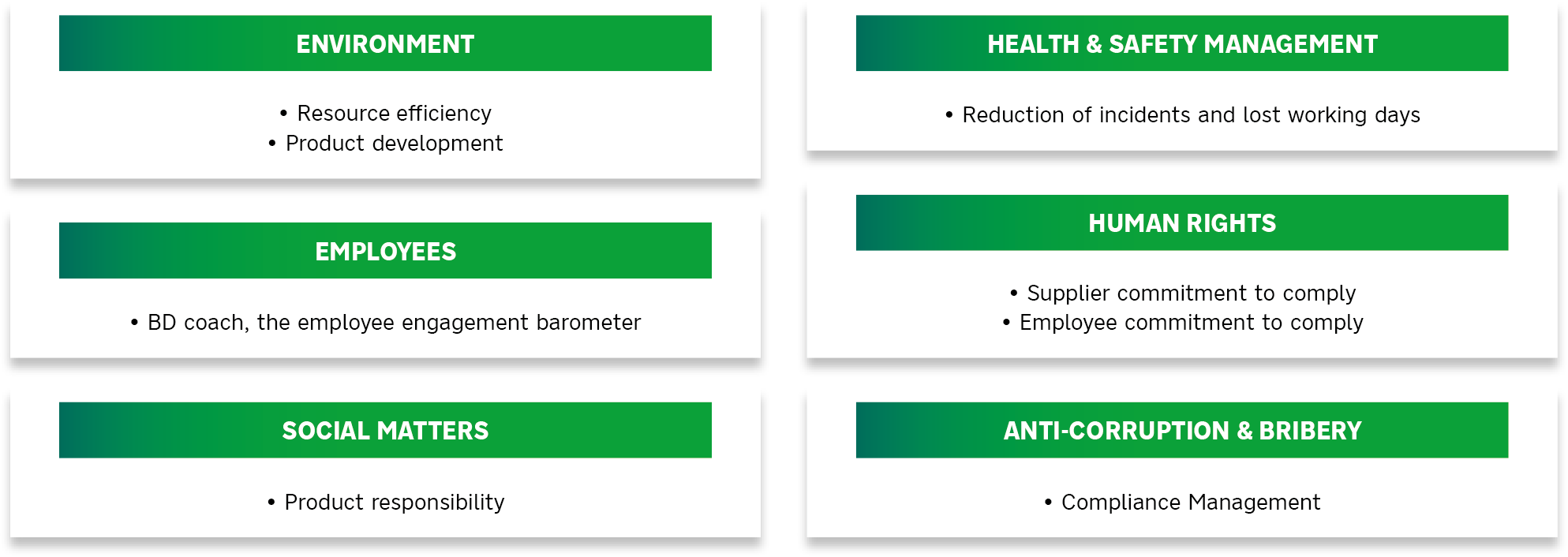
CWS offers professional hygiene and workwear solutions. The division is one of the international leaders in this field with activities in 16 European countries.
Reusability is part of the company's corporate philosophy. This is because CWS stands for products offered through a rental service – the circular economy is an essential component of its business model. Hygienic recycling is just as important as a long useful life for products. The offerings range primarily from collections of workwear to protective and safety clothing, modern hygiene solutions such as towel, soap and fragrance dispensers, as well as dust control mats. The textiles are properly prepared in the division’s own laundries using environmentally friendly processes under long-term service contracts.
CWS is committed to sustainable business practices, to making efficient use of resources and respect for people and the environment. A systematic stakeholder management serves to ascertain the most important issues around sustainability. The results are evaluated from a strategic viewpoint and approved by management. In mid-2017, Rentokil Initial formed a joint venture with the CWS Group, rendering it necessary to review and update the division's CR strategy. The division defined focus areas in the course of an international stakeholder survey, set corresponding action areas and derived appropriate KPIs. It also established an overarching governance structure: all departments are represented on the CR Council, which was founded in 2018, and actively work to develop and implement the CR strategy. The Council worked with the management to develop recommendations on updating the CR objectives in line with the new corporate strategy.
Find out more at www.cws.com/en-IE/sustainability
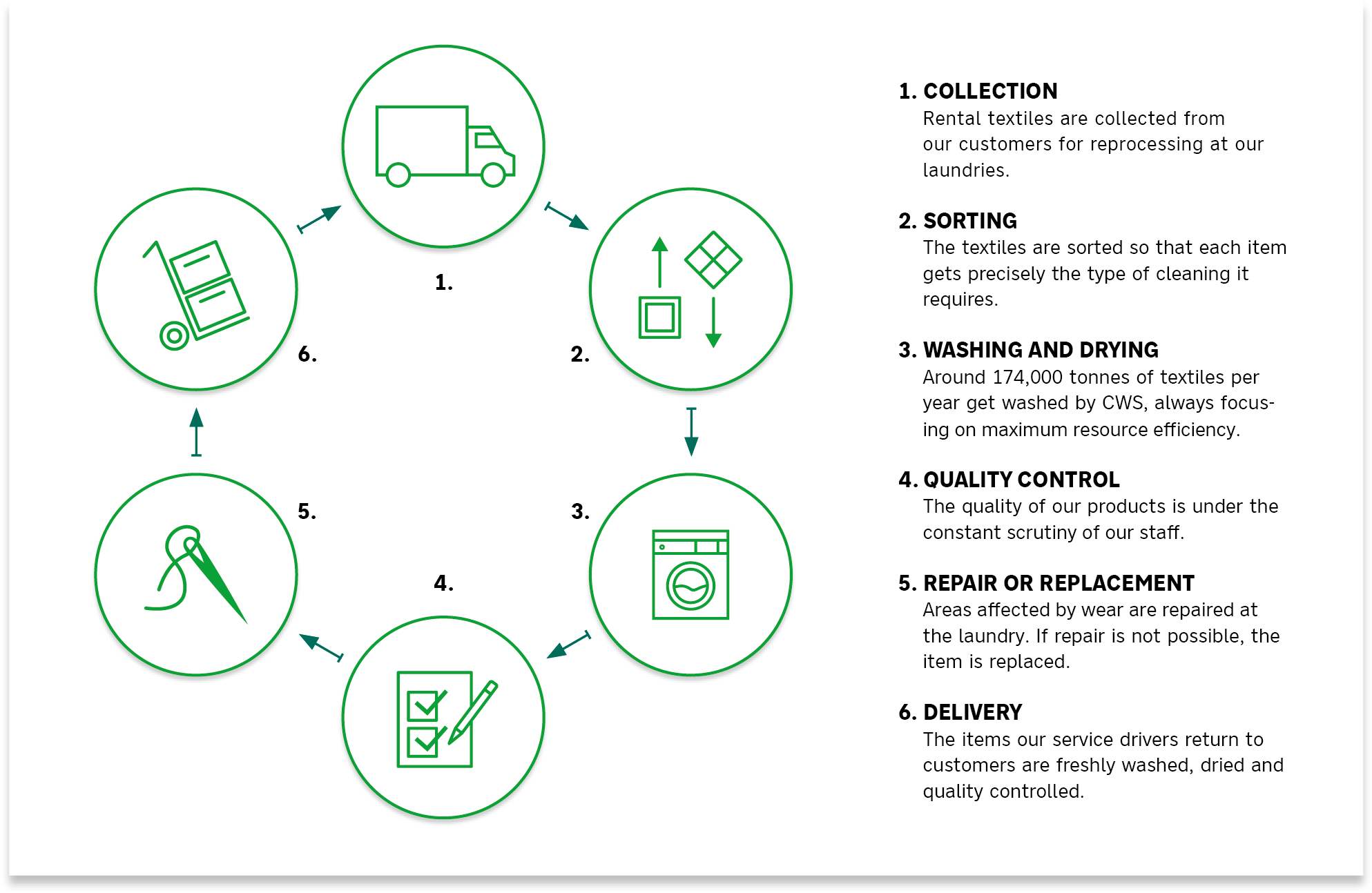
ELG is a global leader in the trading, processing and recycling of raw materials for the stainless steel industry as well as high performance materials such as superalloys, titanium and carbon fibres with 53 locations in North America, Europe, Asia and Australia.
ELG delivers secondary raw materials that are checked for quality and adapted to the customer’s needs. The recycling business is a material part of the service spectrum: production waste is recycled and returned to the customer in the desired quality.
As a recycling business, sustainability is by nature anchored in ELG's business model and corporate philosophy. Promoting responsibility among employees, ethical business practices and strong partnerships with stakeholders are also a focal point of operations. ELG therefore carried out a stakeholder dialogue, which demonstrated which sustainability issues are of particular importance for the company and its stakeholders, as well as for employees, customers, suppliers, banks and Haniel as a shareholder. The various topics were brought together under four priority areas. Many of the measures carried out under these priority areas were initiated by local management, with CR officers in head office coordinating, monitoring progress and communicating developments.
Find out more at www.elg.de/en/sustainability.html
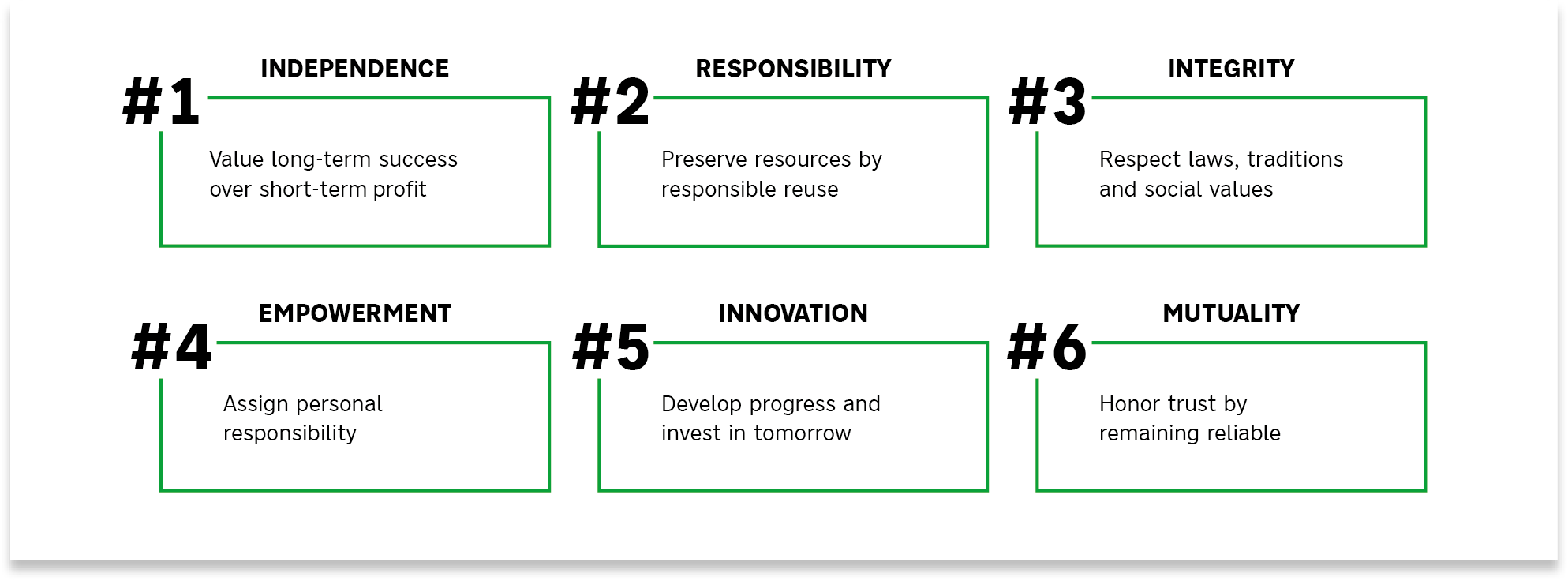
Optimar is a global leader for automated fish processing systems for use on ships, on land and in fish farms. These systems are installed as turnkey projects, either independently or in connection with third-party components. As a full-service provider, Optimar also offers complementary products and services. The company delivers to international customers in more than 30 countries.
Careful fish handling – this is Optimar's corporate philosophy, which pursues two guiding principles: animal welfare and food safety of fish products. The division has recognised a strong correlation between sustainable profitability and responsible business practices. This attitude is also reflected in the company's ESG (environmental, social and governance) standards. In addition to complying with regulations, Optimar places great store in loyalty, teamwork, openness and participation.
Optimar has been a part of the Haniel portfolio since December 2017 and is establishing a professional CR management system that is tailored to its own business model and is appropriate given the size of the company. A CR Officer has coordinated various activities since 2018.
Find out more at www.optimar.no
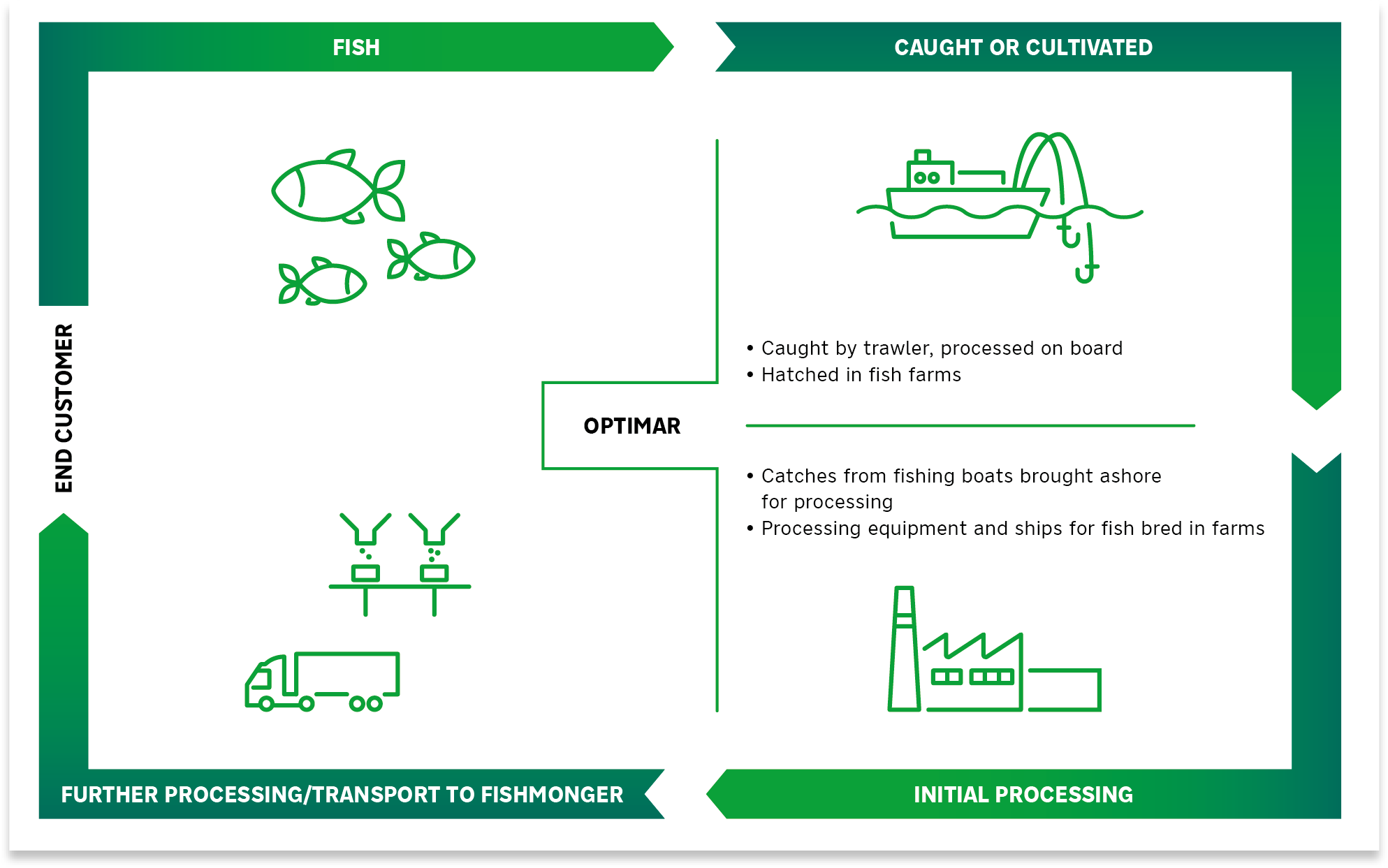
ROVEMA is a premium provider of packaging machines and equipment. The company's product portfolio includes solutions for the entire spectrum of primary and secondary packaging: dosing, vertical form fill and seal (VFFS), cartoning and final packaging machines. The offering is supplemented by a variety of different services. The company operates at eleven locations and is present in more than 50 countries.
Since its acquisition by Haniel in November 2017, based on the corporate strategy, the division identified its core sustainability issues under the leadership of the management, which it summarised into four focal points: Save Energy, Save Food, Sustainable Packaging and Supply Chain. The activities under these focal points are aimed at promoting the sparing use of resources and protecting the quality of food. Progress in the four sustainability action areas is tracked and communicated at the department level by a CR Officer.
Sustainable economic, ecological and social conduct is an indispensable element of ROVEMA's entrepreneurial culture. A code of conduct based on the corporate values of the company and the UN Global Compact's ten principles serves as a guideline for all employees. Compliance rules have also been set out for suppliers in a code of conduct.
Find out more at www.rovema.com/en/engineering/sustainability
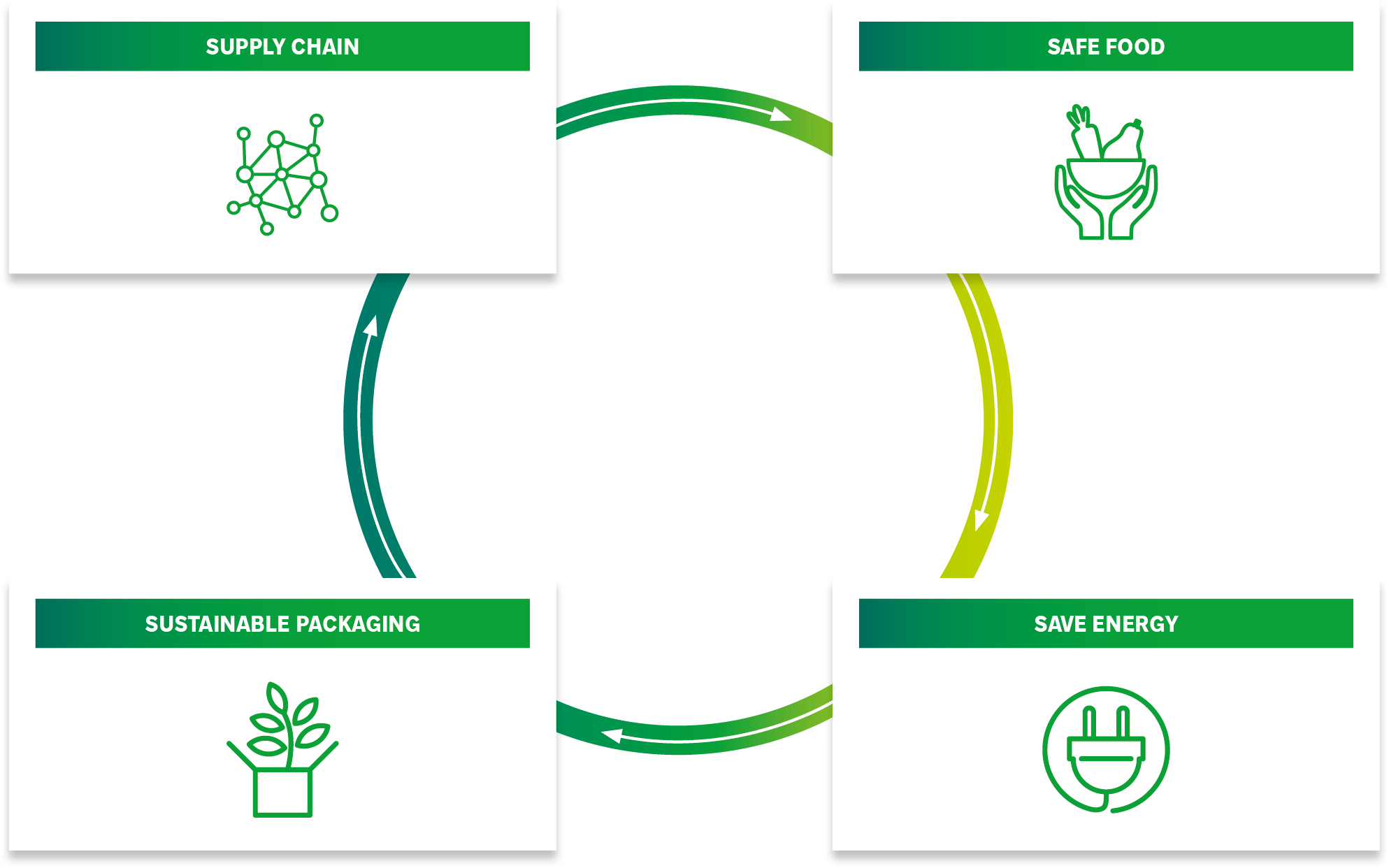
TAKKT brings together a portfolio of B2B mail-order specialists for business equipment in Europe and North America. Each company follows an essentially comparable business model, but with a different focus with respect to customer groups, product lines, regions or distribution channels.
The sales brands concentrate mainly on the sale of durable, price-stable equipment as well as special items for recurring use to corporate customers. The product range comprises operating and warehouse equipment, office furniture, transport packaging, display products as well as equipment for the restaurant sector and retail grocery trade.
At TAKKT profitable growth and sustainability go hand in hand. The company-wide SCORE 'Sustainable Corporate Responsibility' programme lays the foundation for coordinating sustainable business management measures across all segments and for implementing those measures in day-to-day operations. TAKKT has developed a sustainability strategy for the years to come: the core issued were identified in a stakeholder dialogue, assigned weightings and corresponding measures were initiated to implement them and achieve goals. Having an established system of indicators is an important instrument to ensure that progress is measurable and transparent.
Find out more at www.takkt.de/en/sustainability
